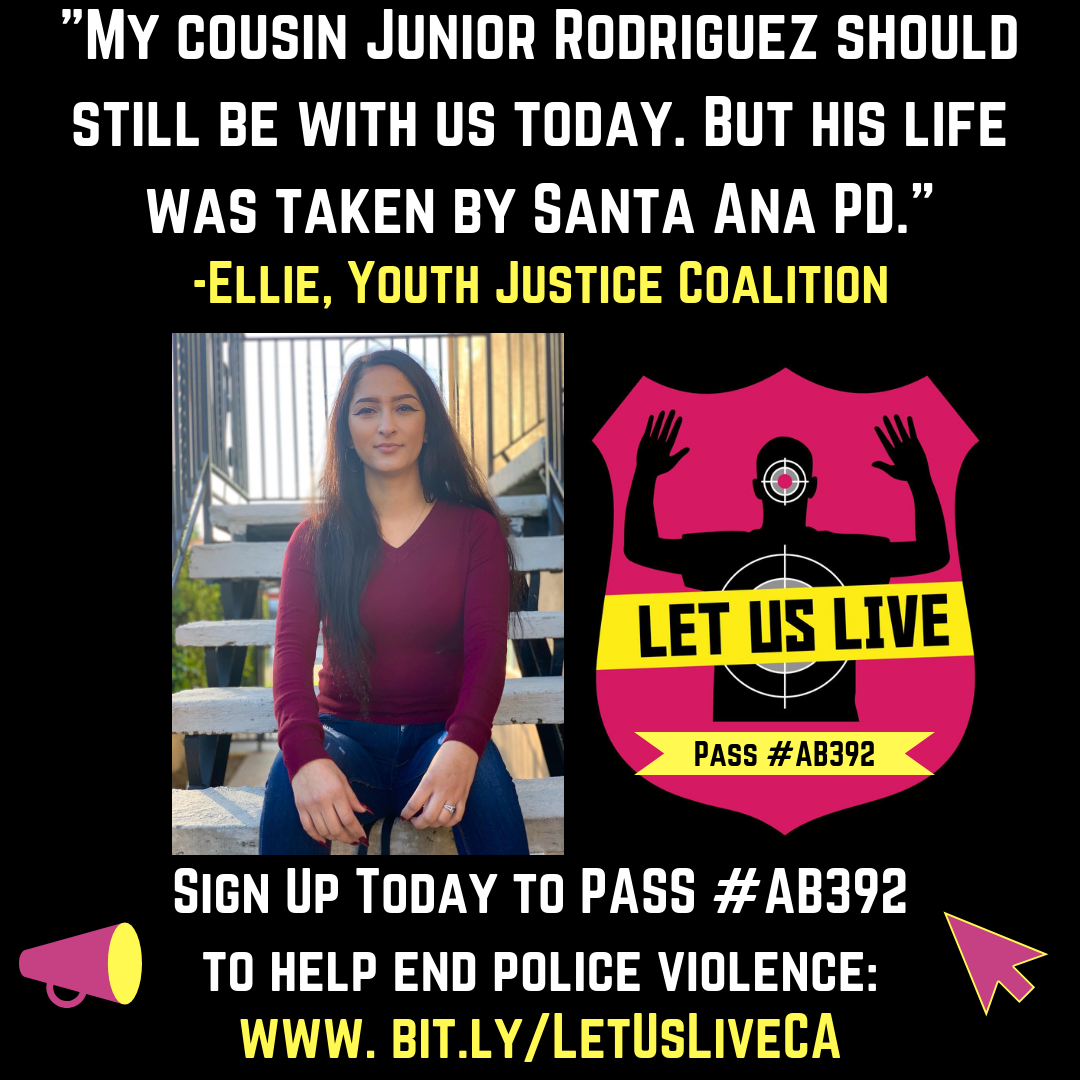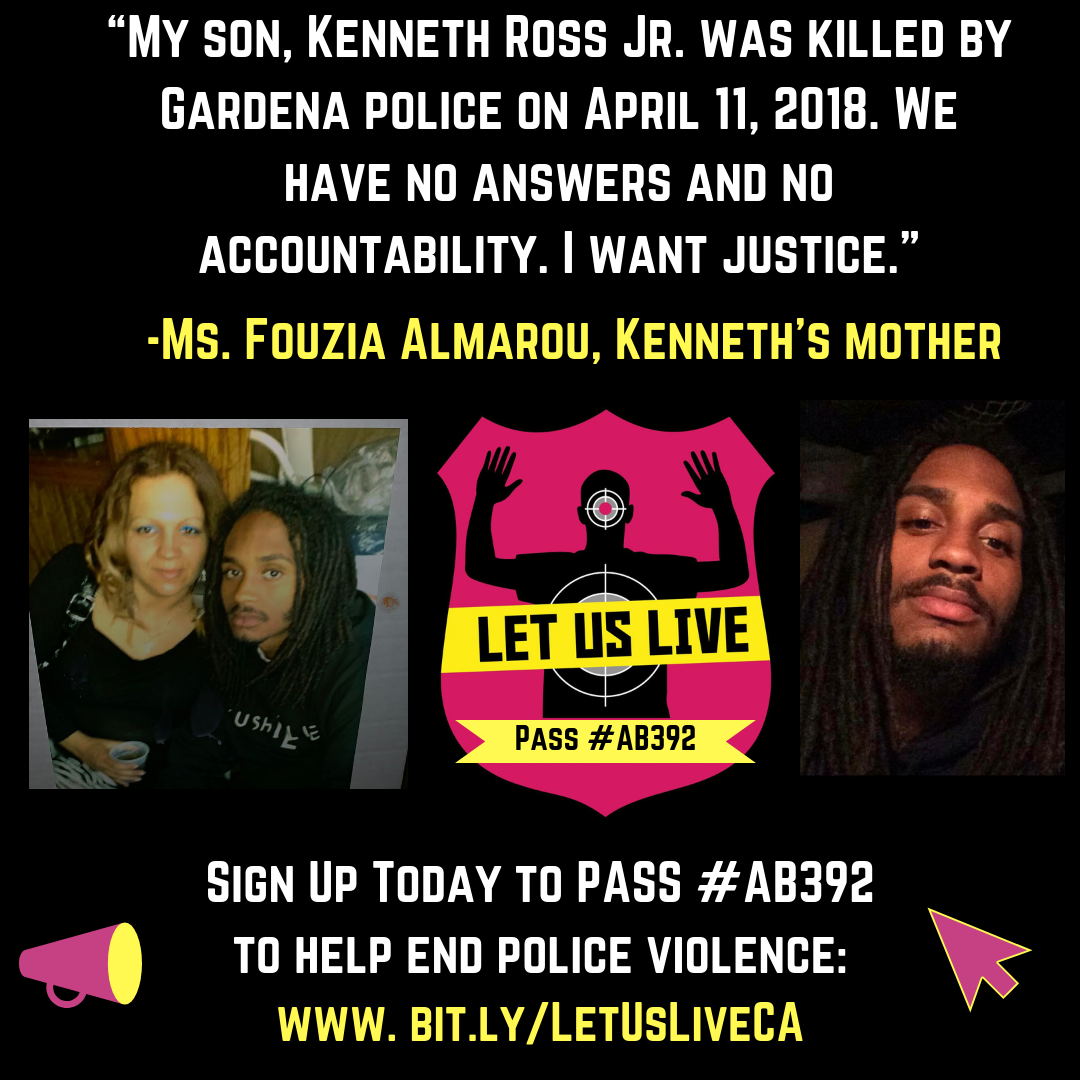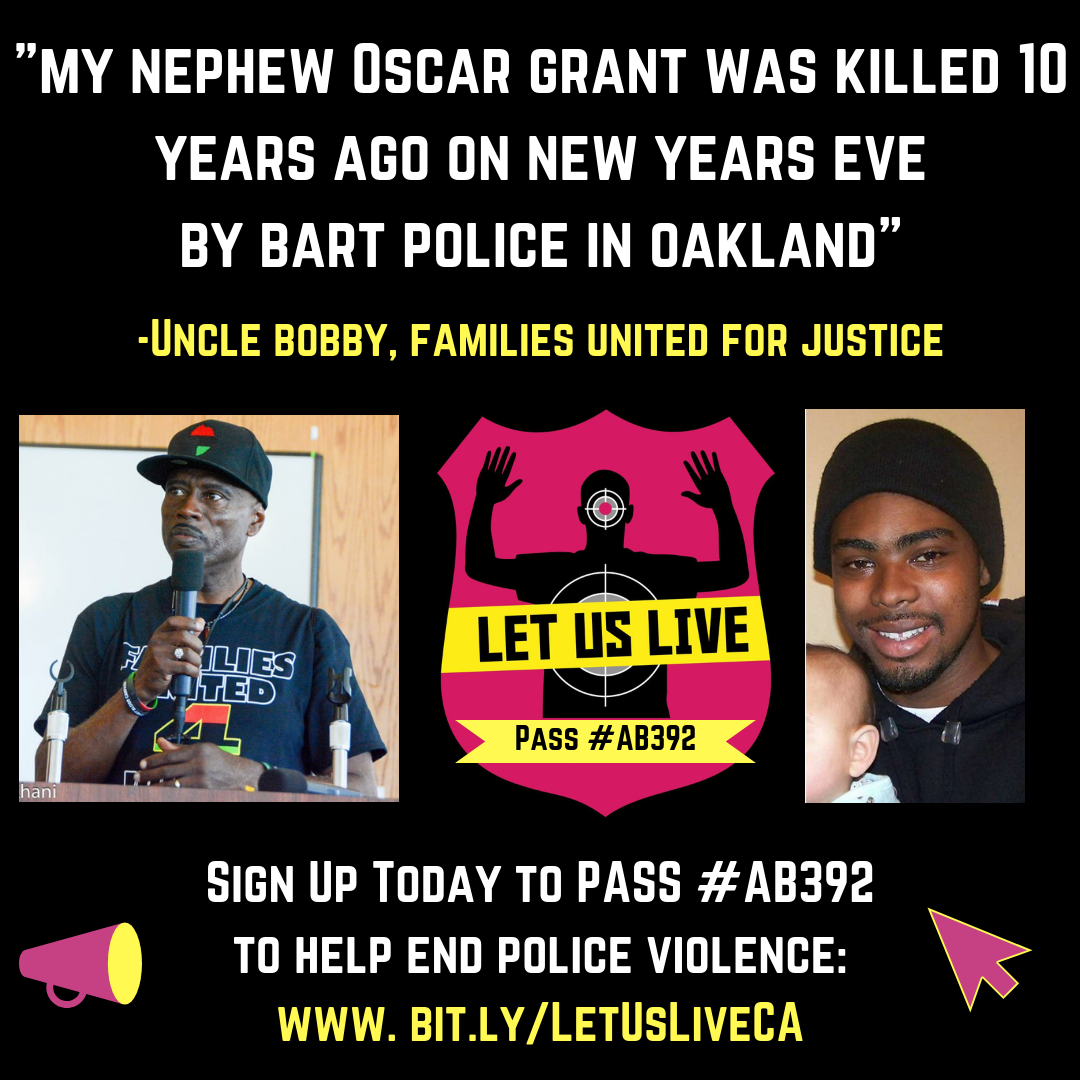California Set to Pass Landmark Legislation to Save Lives, Reduce the Number of Police Shootings
FOR IMMEDIATE RELEASE
July 8, 2019
Under AB 392, California will establish one of the strongest use of force laws in the country by requiring that officers only use deadly force when necessary
Sacramento, Calif. – Today, the California Senate passed landmark legislation to strengthen the law on police use of force and reduce the number of deadly police shootings in the state. Assembly Bill 392: The California Act to Save Lives, introduced by Assemblymember Shirley Weber (D-San Diego), will establish a “necessary” use of force standard, paving the way for other states to follow suit.
Police officers in California consistently kill more people than officers in any other state. As in other states, Black and Latinx people and people with disabilities are more likely than other residents to be targets of police violence. AB 392 addresses this problem head on by adopting best practices proven to reduce the number of use of force incidents.
“I believe that a law like AB 392 could have saved Diante’s life,” said Ciara Hamilton, whose cousin Diante Yarber was killed in Barstow on April 5, 2018. “Police officers should always do everything in their power to preserve life. I shouldn’t have to fear for my life because police officers mistake my phone for a gun or shoot into a vehicle that I’m in because of the color of my skin.”
Under current law, California police officers can use deadly force if it is “reasonable” – regardless of whether deadly force was necessary to prevent imminent death or serious bodily injury, whether there were available alternatives, or whether the officer’s own actions created the circumstances that led to the use of deadly force. AB 392 raises that standard to require that officers only use deadly force when “necessary to defend against an imminent threat of death or serious bodily injury to the officer or to another person.” California would be the only state to combine this “necessary” standard with the requirement that courts consider an officer’s conduct leading up to a use of deadly force when determining whether the officer’s actions were justified.
“I am pleased to see AB 392 pass,” said Marissa Barrera, whose brother Michael Barrera was killed on February 8, 2017 by Woodland police officers outside of Sacramento. “My family and I have been fighting for change for the past two and a half years, since my brother was wrongfully killed. Since then, I have met countless other families that are affected by the loss of their loved ones to police killings. I see this bill as a start to change, which we desperately need.”
Establishing a “necessary” standard has been shown to reduce the number of use of force incidents. Under the guidance of the Obama Department of Justice, Seattle and San Francisco’s police departments both successfully adopted a use of force standard like that of AB 392. According to a report from the federal court monitor, Seattle saw a significant reduction in the number of use of force incidents, while police officers and the public remained just as safe. San Francisco also saw similar declines in use of force incidents: The San Francisco Police Department hasn’t shot a single person in almost a year. Across the country, police officers in cities with stricter use of force standards kill fewer people and are less likely to be injured or killed themselves.
“Today, our family applauds the passage of AB 392 through the Senate floor, this is an important step,” said Pamela Fields, whose son was killed November 10, 2013. “My son Donte Jordan should be alive today, but his life was taken by Long Beach PD. I have no choice but to fight for justice every day, can't stop won't stop!”
AB 392 now heads to California Governor Gavin Newsom for his signature.
###
AB 392 is sponsored by the Alliance for Boys and Men of Color/PolicyLink, ACLU of California, Anti Police-Terror Project, Communities United for Restorative Youth Justice (CURYJ), California Families United 4 Justice, PICO California, STOP Coalition, United Domestic Workers (UDW) – AFSCME Local 3930, Youth Justice Coalition.
Anti Police-Terror Project Statement on AB 392, the California Act to Save Lives
From our inception, the Anti Police-Terror Project has never subscribed to the belief that policing in America can be fixed. The system is not broken and thus cannot be made to right itself. Born of the slave trade, policing in America was then - and is now - about the catching, killing and incarcerating of Black and Indigenous bodies. We are an abolitionist organization committed to interrupting and rapidly responding to state violence, radically transforming the way in which we as a society define public safety and develop new practices to implement community security that are not rooted in race-based capitalism, white supremacy, patriarchy, racism, violence, rape and murder. The data is clear - the American model of criminal justice is a failed experiment that has cost thousands of lives.
That said, bodies are falling at the hands of state violence in genocidal proportions, so as we walk the road to absolute abolition - we also need to deal with the material conditions our communities are facing right now. The police in California kill nearly 200 people every single year, the majority of whom are people of color and over half of whom are unarmed. This reality for us means that we must work to enact radical reforms as we walk the road to abolition, thus operating in all lanes toward liberation.
Over the last few weeks, it became apparent that AB 392 - the Use of Force Bill - was no longer a “radical” bill. Despite that fact, we remain a cosponsor and stand with the Let Us Live Coalition and Assemblymember Dr. Shirley Weber in seeing the bill through to victory.
This is why.
Sacramento Conditions
Currently, in our State’s Capitol, police associations wield an unrivaled amount of power. Democrats and Republicans in both the Senate and the Assembly are unwilling to cross the police associations for fear of ending their political careers. The amount of money that law enforcement funnels into political campaigns and other legislative endeavors is unmatched by almost any other special interest group, and they are always ready to enter a pro-police candidate into a race to challenge any politician who dares not do their bidding.
An Evolving Political Context
How, in an environment heavily influenced by law enforcement, were we able to pass a bill through the Assembly that effectively reforms current use of force law and has law enforcement withdraw opposition?
The movement built over the last ten years in California has had both state and national implications on the public debate around policing. Gone are the days where police can sweep their murderous records under the rug. There is a new conversation about accountability and the masses are clear that the current model of doing business is not working for anyone.
The tireless organizing of countless families of victims of police violence, their communities, their advocates, and supportive labor unions has worn down the legislature. Legislators are tired of testimony, tired of demonstrations, tired of being constantly reminded of the cost of their fealty to law enforcement.
With a big election year in 2020, many legislators were afraid to risk being exposed by expressing their allegiance to either side. What better way to prevent exposure than to attempt to pressure a compromise that prevents any legislator from being forced to pick sides?
It is important to note that this approach would not have worked without the persistence of Assemblymember Dr. Shirley Weber. Dr. Weber took heat from all sides and throughout remained steadfast to a bill that - regardless of amendments - would stay true to the bill’s original intent: Change the legal standard under which law enforcement can justify utilizing lethal force and hold police criminally liable when there is no justification to be found. This bill - in its current form - does just that.
A Heightened Standard
While much of the aspirational and radical language that remained in the bill for the majority of this legislative cycle was removed, this bill remains one of the most - if not the most - restrictive bill in the country with respects to police use of force. While law enforcement is working feverishly to save face and spin this into a win; they know - and we know - what really occurred: They were forced to accept a heightened use of force standard with accompanying language and restrictions that they fought tooth and nail for two years to reject.
The Families
There are dozens of families across the state who still support this bill and who have fought endlessly - enduring unimaginable trauma - in hopes of preventing this horrific tragedy from happening to another family ever again. We stand in solidarity with them.
The Money
Yes. It is true that the police will get more money for training. Our understanding is that this money will go to POST and not to individual departments and be solely utilized to train police on this new standard. To our minds, we want that training to take place so they can’t say they didn’t have it as a justification for not adhering to the new law.
Language Concerns
As the legal standard 392 creates is subject to the interpretation of DAs and the courts, our coalition worked to give as much direction as possible to those entities in the bill itself. Our main concern with the latest round of changes to AB 392’s language was that de-escalation, once prominent in the bill’s language, was made an implicit requirement. While we are disappointed that the most direct language has been removed from the bill, AB 392 still includes the components necessary to require district attorneys and courts to look at use of force incidents much differently than they have been under current law.
Our Conclusion
We remain in support of AB 392 because it moves California from our position as a state with one of the worst use of force standards in the country to a state with one of the most stringent use of force standards in the country. We consider that to be an incredible victory with respects to the current power dynamics at play.
Is this radical reform? No. Does this give us a better opportunity to hold law enforcement accountable when they kill one of our own? Yes.
So while it is clear that there is much base-building, organizing and educating to be done across the State with respects to police, police violence, and the power of the police lobby, it is also clear that this legislation represents an opportunity to make it more difficult for law enforcement to kill with impunity while we build power and capacity in a manner that paves the way for radical reforms to come to fruition in our near future.
The work now must focus on building the people power necessary so that legislators are more afraid of us than they are of the police associations. The reality is that under the current conditions, when we play the state’s games, this outcome - at great cost - is the best we can expect. And as we cannot change the rules of the game, we must change the game itself. That is the mandate of now.
AB 392 is sponsored by the Alliance for Boys and Men of Color/PolicyLink, ACLU of California, Anti Police-Terror Project, Communities United for Restorative Youth Justice (CURYJ), California Families United 4 Justice, PICO California, STOP Coalition, United Domestic Workers (UDW), AFSCME Local 3930, Youth Justice Coalition.






